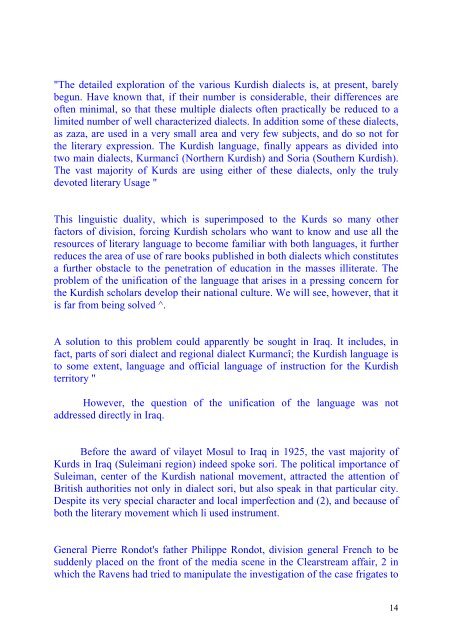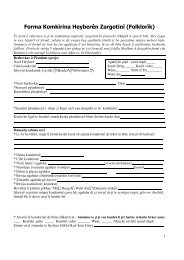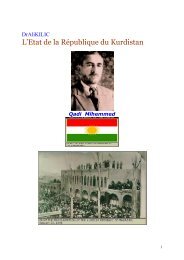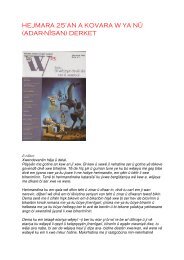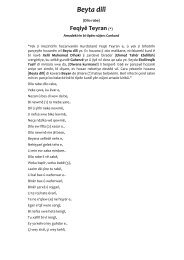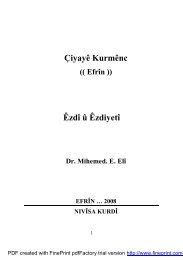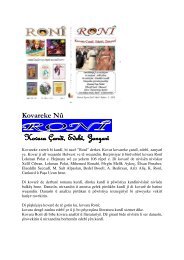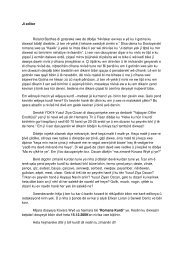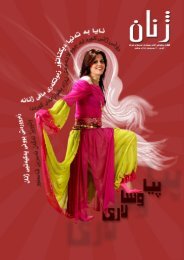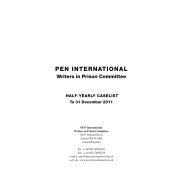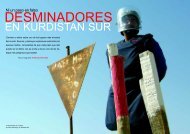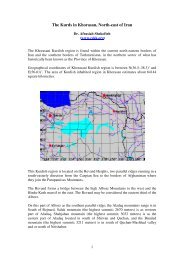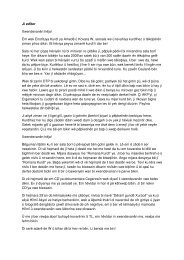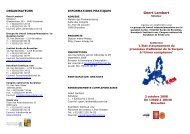UNESCO and The International Day of Mother Language - Pen-Kurd
UNESCO and The International Day of Mother Language - Pen-Kurd
UNESCO and The International Day of Mother Language - Pen-Kurd
- No tags were found...
You also want an ePaper? Increase the reach of your titles
YUMPU automatically turns print PDFs into web optimized ePapers that Google loves.
"<strong>The</strong> detailed exploration <strong>of</strong> the various <strong>Kurd</strong>ish dialects is, at present, barely<br />
begun. Have known that, if their number is considerable, their differences are<br />
<strong>of</strong>ten minimal, so that these multiple dialects <strong>of</strong>ten practically be reduced to a<br />
limited number <strong>of</strong> well characterized dialects. In addition some <strong>of</strong> these dialects,<br />
as zaza, are used in a very small area <strong>and</strong> very few subjects, <strong>and</strong> do so not for<br />
the literary expression. <strong>The</strong> <strong>Kurd</strong>ish language, finally appears as divided into<br />
two main dialects, Kurmancî (Northern <strong>Kurd</strong>ish) <strong>and</strong> Soria (Southern <strong>Kurd</strong>ish).<br />
<strong>The</strong> vast majority <strong>of</strong> <strong>Kurd</strong>s are using either <strong>of</strong> these dialects, only the truly<br />
devoted literary Usage "<br />
This linguistic duality, which is superimposed to the <strong>Kurd</strong>s so many other<br />
factors <strong>of</strong> division, forcing <strong>Kurd</strong>ish scholars who want to know <strong>and</strong> use all the<br />
resources <strong>of</strong> literary language to become familiar with both languages, it further<br />
reduces the area <strong>of</strong> use <strong>of</strong> rare books published in both dialects which constitutes<br />
a further obstacle to the penetration <strong>of</strong> education in the masses illiterate. <strong>The</strong><br />
problem <strong>of</strong> the unification <strong>of</strong> the language that arises in a pressing concern for<br />
the <strong>Kurd</strong>ish scholars develop their national culture. We will see, however, that it<br />
is far from being solved ^.<br />
A solution to this problem could apparently be sought in Iraq. It includes, in<br />
fact, parts <strong>of</strong> sori dialect <strong>and</strong> regional dialect Kurmancî; the <strong>Kurd</strong>ish language is<br />
to some extent, language <strong>and</strong> <strong>of</strong>ficial language <strong>of</strong> instruction for the <strong>Kurd</strong>ish<br />
territory "<br />
However, the question <strong>of</strong> the unification <strong>of</strong> the language was not<br />
addressed directly in Iraq.<br />
Before the award <strong>of</strong> vilayet Mosul to Iraq in 1925, the vast majority <strong>of</strong><br />
<strong>Kurd</strong>s in Iraq (Suleimani region) indeed spoke sori. <strong>The</strong> political importance <strong>of</strong><br />
Suleiman, center <strong>of</strong> the <strong>Kurd</strong>ish national movement, attracted the attention <strong>of</strong><br />
British authorities not only in dialect sori, but also speak in that particular city.<br />
Despite its very special character <strong>and</strong> local imperfection <strong>and</strong> (2), <strong>and</strong> because <strong>of</strong><br />
both the literary movement which li used instrument.<br />
General Pierre Rondot's father Philippe Rondot, division general French to be<br />
suddenly placed on the front <strong>of</strong> the media scene in the Clearstream affair, 2 in<br />
which the Ravens had tried to manipulate the investigation <strong>of</strong> the case frigates to<br />
14


